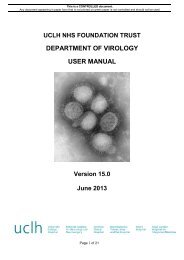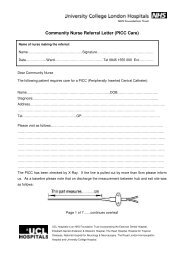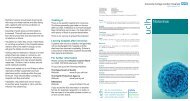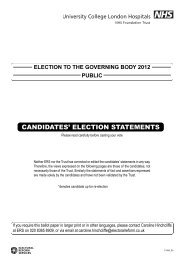Vitamin K Prophylaxis - University College London Hospitals
Vitamin K Prophylaxis - University College London Hospitals
Vitamin K Prophylaxis - University College London Hospitals
Create successful ePaper yourself
Turn your PDF publications into a flip-book with our unique Google optimized e-Paper software.
The Department of<br />
Health recommends<br />
that all babies are<br />
given a vitamin K<br />
supplement at<br />
birth. This leaflet<br />
explains why.<br />
What is vitamin K?<br />
<strong>Vitamin</strong> K is a vitamin which occurs naturally in<br />
food such as green leafy vegetables, some oils<br />
such as olive oil and is made by bacteria in our<br />
large intestine. <strong>Vitamin</strong> K is required for the blood<br />
to clot properly preventing abnormal bleeding.<br />
Newborn babies commonly do not have enough<br />
vitamin K because very little is passed to the<br />
baby in the womb from its mother, breast milk<br />
only contains small amounts of vitamin K and<br />
bacterial production in the gut takes some time<br />
to be established.<br />
A small number of babies may bleed due to<br />
vitamin K deficiency. This is called haemorrhagic<br />
disease of the newborn (HDN). This risk of bleeding<br />
is effectively removed when sufficient extra<br />
vitamin K is given to babies.<br />
Haemorrhagic disease of the newborn is a disorder<br />
which occurs almost exclusively in babies who are<br />
not given vitamin K at birth. Bleeding may occur<br />
at any time for several weeks after birth. Early<br />
signs of HDN may be blood loss from the umbilicus<br />
or the gut. Rarely bleeding is more serious, the<br />
greatest concern being bleeding into the brain<br />
which can lead to brain damage or even death.<br />
What’s the risk?<br />
Between 2.5 and 17 out of every 1,000 babies<br />
who do not receive vitamin K will have some<br />
bleeding but the risk of serious bleeding is small.<br />
About 1 in 10,000 babies who do not receive<br />
vitamin K will bleed into their brain, about a third<br />
of these will suffer serious permanent brain injury<br />
or die.
















